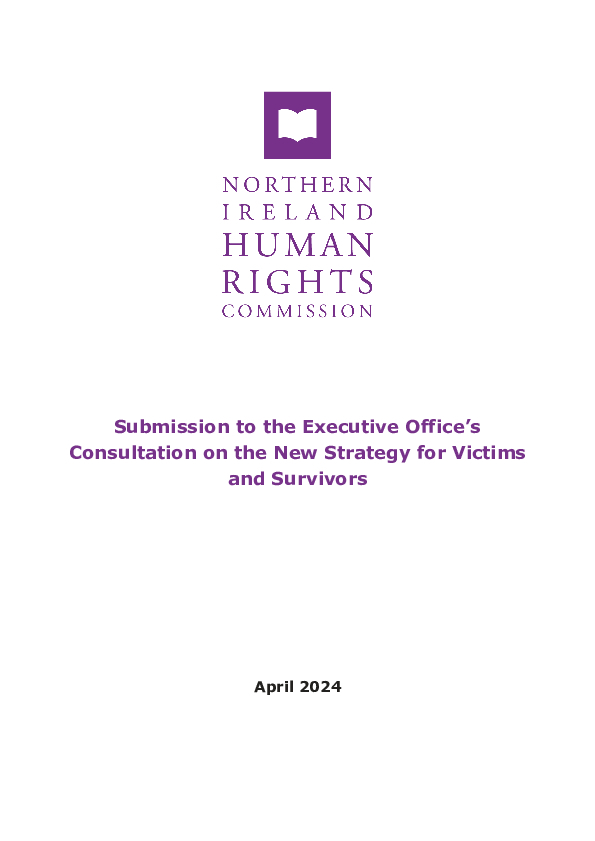NIHRC Submission to the Executive Office’s Consultation on the New Strategy for Victims and Survivors
Date produced: April 2024.
Below is a summary of theNorthern Ireland Human Rights Commission's (NIHRC) recommendations and messages.
You can also download the full document through the links provided.
The NI Human Rights Commission advises and recommends:
2.4 The NIHRC recommends that the Executive Office revisits the human rights impact assessment with a view to examining the full range of human rights standards identified in Annex 1 as directly relevant to the draft strategy.
2.12 The NIHRC recommends that the Executive Office revisit the Human Rights Impact Assessment and consider Windsor Framework Article 2. It should incorporate within its consideration the minimum standards in relevant EU law relating to victims’ rights.
2.13 The NIHRC recommends that the Executive Office build consideration of Windsor Framework Article 2 into the development and implementation of any and all policy on victims and survivors.
2.19 The NIHRC recommends that the Executive Office adopts a human rights based approach to the whole of the strategy and that it must include the full range of internationally accepted human rights standards, including Windsor Framework Article 2 and the relevant EU law minimum standards. This approach should incorporate corresponding State obligations relating to victims and survivors of serious human rights abuses. This should also ensure specific actions and time-bound measures are provided that demonstrate contribution towards each high level outcome.
2.25 The NIHRC recommends that the Executive Office establishes a system to oversee, monitor, evaluate, and report on the provision of redress measures and services to victims under the strategy. This includes data collection that is disaggregated, regular, comprehensive and comparable.
2.30 The NIHRC recommends that the Executive Office secures ring-fenced, multi-year funding that extends across the lifespan of the strategy.
3.3 The NIHRC recommends that the Executive Office ensures that the fundamental concerns with the NI Troubles (Legacy and Reconciliation) Act 2023 are addressed to the greatest extent possible within the strategy, including adopting human rights based and victim-centred mitigation strategies that protect victims’ and survivors’ access to justice, redress and rehabilitation. Victims and survivors and their representative organisations should be meaningfully involved in designing, implementing and evaluating the mitigation measures taken.
3.16 The NIHRC recommends that the Executive Office considers and makes explicit provision for the diverse needs of a broad range of victims and survivors, particularly but not limited to those from marginalised groups and/or individuals experiencing intersectional discrimination.
3.26 The NIHRC recommends that the Executive Office considers and reports on how the strategy intersects with other government strategies and what specific actions will be taken to ensure a holistic approach is taken to issues affecting victims and survivors. This should include, by way of example, the Social Inclusion Strategies; the Tackling Paramilitarism Programme; the Modern Slavery and Human Trafficking Strategy; the Domestic Abuse and Sexual Violence Strategy; and the Co-operating to Safeguard Children and Young People Strategy.
3.27 The NIHRC recommends that the Executive Office sets out how the strategy is raising awareness of and giving effect to the rights contained in the EU Victims’ Directive including by reducing the risk of victimisation and the specific and targeted measures being undertaken to protect victims against secondary and repeat victimisation, intimidation and retaliation.
3.28 The NIHRC recommends that the Executive Office includes within the strategy specific measures to ensure the best interests of the child are the primary consideration.
3.29 The NIHRC recommends that the Executive Office includes within the strategy the measures that will be taken to avoid discrimination in delivery and to meet victims’ specific needs.
3.36 The NIHRC recommends that the Executive Office includes specific measures to address the delay in the Victims’ Payment Scheme so that it offers fair, adequate, and prompt compensation to all who are eligible.
3.37 The NIHRC recommends that the Executive Office includes measures targeted at addressing the risk of re-traumatisation. This should include ensuring that specialised support is available, accessible and securely funded throughout an applicant’s journey.
3.40 The NIHRC recommends that the Executive Office provides within the strategy for the appropriate training of practitioners and officials likely to come into contact with victims. This should be aligned to the minimum standards set out in the EU Victims’ Directive. At the very least it must enable officials to recognise victims and to treat victims in a respectful, professional, impartial and non-discriminatory fashion.

Download Documents
Your browser is out-of-date!
Update your browser to view this website correctly. Update my browser now